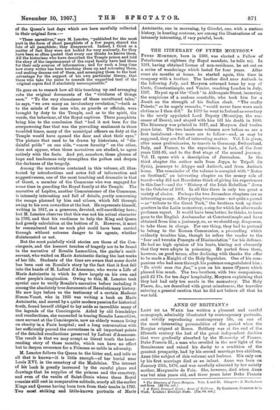THE ITINERARY OF FT - RFS IlfOltYSON.* FYNES MORYSON, born in 1566,
was elected a Fellow of Peterhouse at eighteen (by Royal mandate, he tells us). In 1591, having obtained license of non-residence, he set out on a series of wanderings which lasted for four years. After some six months at home, he started again, this time in company with a brother. The brother died near Antioch in the following July, and Moryson returned home by way of Crete, Constantinople, and Venice, reaching London in July, 1597. He put up at the Cock' in Aldersgate Street, incurring the suspicions of a zealous constable, who took him for a Jesuit on the strength of his Italian cloak. "The crafty Priests," as he sagely remarks, "would never have worn such clothes as I then did." In 1599 he went to Ireland as secretary to the newly appointed Lord Deputy (Mountjoy, the suc- cessor of Essex), and stayed with him till his death in 1606. The Itinerary was printed in 1617, and Moryson died twelve years later. The two handsome volumes now before us are a first instalment—two more are to follow—and, as may be supposed, they are full of interesting matter. Vol. I. is given, after some preliminaries, to travels in Germany, Switzerland, Italy, and France, to the experiences, in fact, of the four years 1591-95, and to the first stage of the second journey.
Vol. II. opens with a description of Jerusalem. In the third chapter the author sails from Joppa to Tripoli (in Syria.), journeys to Aleppo and Antioch, and from Antioch home. The remainder of the volume is occupied with "Notes on Scotland," an interesting chapter on the money side of travel—why did not Herodotus think of giving his experiences in this line P—and the " History of the Irish Rebellion" down to the October of 1601. In all this there is only too great a variety of choice. Perhaps the two Jerusalem chapters are as interesting as any. After paying two sequins—not quite a pound —as " tribute to the Great Turk," the brothers took up their quarters in the Latin monastery, a step for which he afterwards professes regret. It would have been better, he thinks, to have gone to the English Ambassador at Constantinople and have obtained from him a janissary, or, as we should say, dragoman, to take them in charge. For one thing, they had to pretend to belong to the Roman Communion, a proceeding which evidently troubles him, though he refers the reader to the "four and twentie Precepts of Dissimulation" for his defence. He had no high opinion of his hosts, hinting not obscurely that they were adepts in poisoning. He parted from them, however, on good terms, after declining with thanks the offer to be made a Knight of the Holy Sepulchre. One of his com- panions who had seen through his pretence congratulated him : "En tgrite vous etes fine," a pun on his name (Fynes) which pleased him much. The two brothers, with two companions, paid £2 17s. for ten days' hospitality, Moryson explaining that they had had only ten meals in the monastery. The Holy Places, are., are described with great minuteness, the traveller entering a general caution that he did not believe all that he was told.


















































 Previous page
Previous page